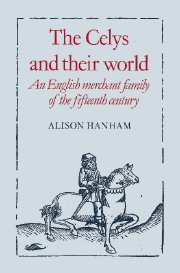Postscript on later family history
Published online by Cambridge University Press: 06 July 2010
Summary
We learn more about William Maryon's material circumstances from his will than ever emerged from references to him in the papers of his close friends, the Celys. He drew it up on 7 May 1493, about two months before his godson Richard Cely made his own will, but died later than Richard, and probate was not obtained until 6 February 1494. Maryon's executors were Richard's wife Anne and his own nephew, Robert Eyryk, who were left the residue of the estate and all moveables not otherwise disposed of. Some of his properties, ‘lands freehold and copyhold’, tenements, meadows and pastures in Watford and Bushey, were to go to Richard Cely for his life and then to his daughter ‘Barbara’, Maryon's goddaughter, and to her elder sisters and their heirs if she died before marriage. Robert Eyryk and his wife Elizabeth were to have property in Great Billing, five miles north-east of Northampton, and also two tenements in Watford; one, formerly Grafton's, in which Maryon's ‘mother-in-law’ was living, and the other, at the furthest end of the town, which had been bought from John Waleys, with three acres of meadow lying in the West Mead against ‘Wegyn halle brigge’, i.e. Wiggen Hall bridge. A charge on the Watford properties last mentioned was an ‘obit’ to be kept in the church of his burial for 60 years at 10s a year for priests and clerks and for ale and cheese to poor men.
- Type
- Chapter
- Information
- The Celys and their WorldAn English Merchant Family of the Fifteenth Century, pp. 423 - 430Publisher: Cambridge University PressPrint publication year: 1985



